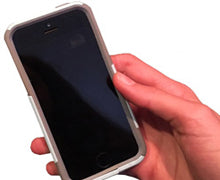
The results of a new study conducted by Virta Health in conjunction with Purdue University and others shows how remote monitoring of participants through the use of a mobile app was instrumental in helping them reverse Type 2 diabetes. To be specific, the phone was not the catalyst for the reversal but it was a big aid in keeping volunteers on track.
The element most responsible for the reversal was nutritional ketosis, which is the process of having the body use fat instead of glucose for fuel. Each of the volunteers were given an individualized approach to achieving and maintaining nutritional ketosis that was tracked through the mobile app and the results were nothing short of amazing.
Study participants lost an average of 30 pounds and 60 percent completely reversed their diabetes, while 94 percent reduced or completely eliminated their use of insulin. And the average reduction in A1C, a marker that represents a person’s average blood glucose over the last 3 months, was 1.3 percent. At the same time, those in the control group saw no change in their A1C levels nor in the amount of insulin they were taking.
“Our results push against the accepted norm that A1C cannot be improved while taking patients off of medication,†said lead investigator Dr. Sarah Hallberg. “Our trial shows we did both—sometimes in a matter of weeks—and sustained and even improved results at one year. Establishing the right intervention and remote support resources is critical for our treatment approach.â€
The ongoing trial started with 349 Type 2 diabetes patients is expected to last five years. These results are based on data after the completion of the first year. The control group consisted of 87 participants whose protocol was to follow the advice of their own physicians and dieticians using American Diabetes Association recommendations. The remaining 262 were given an individual plan for a low-carbohydrate, high-fat diet while using the mobile app to receive educational information and track their progress, as well as stay connected to a health coach, physician and the community of other participants.
“We feel that it is really important to support a patient in many different ways,†Hallberg said. “Making lifestyle changes can be hard, but the ability to ask questions whenever necessary provided patients with a support system to stay on a potentially life-changing program.â€



